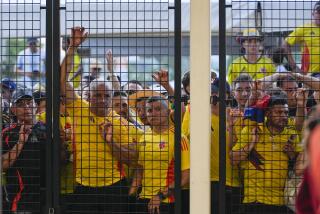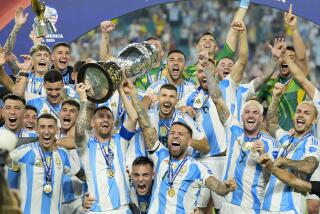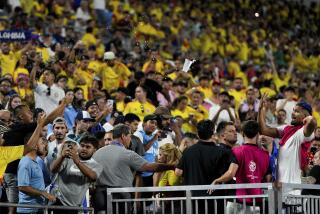WORLD CUP USA ’94 : UNFORGIVABLE : The murder of Colombia’s Andres Escobar after his own goal against the United States underlines the fact that soccer fans can be deadly serious about their game : Players Stunned as Pall Settles Over Soccer’s Showcase
DALLAS — Andres Escobar could have been here this weekend instead of in his violent hometown of Medellin, Colombia.
The popular soccer player, who was murdered early Saturday, was asked to be a color commentator for Carcol radio, Colombia’s premier network, after his team failed to advance to the second round of the World Cup.
Escobar would have been in Carcol’s cramped quarters at the International Broadcast Center in Dallas, where thousands of commentators are covering the World Cup.
“We invited him to stay,” said Gusta Pombo, a network executive.
Escobar considered the assignment but decided against it.
“He said, ‘No, I want to go back home,’ ” Pombo said.
Escobar, who deflected the ball into his goal in a 2-1 loss to the United States on June 22 at the Rose Bowl, was shot 12 times outside a restaurant in Medellin in retribution for the play.
Although Escobar, 27, left America, his parents stayed on to vacation in the southwest. They were in Nevada when the incident occurred.
Escobar’s death was the latest episode to cast a pall over the first World Cup in the United States. Two days earlier, Diego Maradona, one of the sport’s top stars, was suspended by the Argentina Football Federation after testing positive for banned stimulants.
What was an almost universal celebration of soccer for the past two weeks became a day of mourning as the second round began in Chicago and Washington.
Word of Escobar’s murder filtered through the RFK Stadium crowd and the locker rooms, intensifying in an official moment of silence before the Spain-Switzerland game.
A Colombian television crew abandoned its gear and wandered aimlessly through the press center outside the stadium, its appetite for soccer suddenly gone.
“I just found out and I am speechless,” producer Marden David said. “He was 27 and we were friends since he was 19. Andres was the nicest, most decent man on the team, and the most disciplined; the last one you’d think could be. . . .”
Joseph Blatter, general secretary of FIFA, soccer’s governing body, said it was the saddest day he has seen in soccer, beyond violence in the stands or hooliganism.
“The popularity of our game has two faces,” he said. “The first face produces joy and enthusiasm and brings people together as we have witnessed at the World Cup here. On the other face, the game mirrors our life. It has violence, tears, corruption. Like life, it has all its problems.
“Murders happen everywhere, every hour of the day. It is a reality.”
But the timing has made it doubly difficult for FIFA officials.
“It’s like somebody does not like the success of the World Cup,” Blatter said. “I don’t know who to blame. But the two cases we have had in 48 hours--it’s hard to digest for us.”
The incidents also have been an emotional drain for World Cup organizers from the United States. After piquing the American public’s interest beyond their wildest imaginations, the organizers were disheartened by Saturday’s news.
“It’s a blatant criminal act,” said Jim Trecker, World Cup USA spokesman. “It’s deplorable.”
But he does not believe Escobar’s murder and Maradona’s departure will take away from the tournament, which ends July 17 at the Rose Bowl.
“The American people are clearly smitten with soccer,” Trecker said. “It’s a pity some off-the-field tragedies . . . can divert interest in this event for a minute.”
Those involved in the game spoke out against the violence in Colombia that has affected its soccer team, including a death threat sent to midfielder Gabriel Gomez in Fullerton during the World Cup.
Ireland Coach Jack Charlton said he might give Escobar’s family the money collected by Irish fans to help pay a fine assessed against him for sideline outbursts during a match against Mexico.
“Who wants to play international football if you get assassinated doing it?” he asked. “It’s a dreadful thing, just dreadful.”
Players and coaches said soccer’s atmosphere, the passion that is often associated with the sport, has its limits.
“It’s terrible to have someone killed because of a game,” Swiss goalkeeper Marco Pascolo said after his team’s 3-0 loss. “Even for us it’s going to be tough to go home. There are a lot of regrets,”
Soccer violence is common in countries where it is the dominant sport, but usually as collective acts by packs of fans against one another or property.
Attacks against individual players are rare, but all players know to keep clear of outraged fans, and Escobar’s murder left some players pensive.
“This is despicable, an outrage; people should realize it is only a game,” Spanish player Abelardo Fernandez said.
Said Brazil’s coach, Carlos Alberto Parreira: “We’ve got to start understanding that this is a game, not a war, and that all these crazy nationalistic feelings, while fine up to a point, have gone too far.”
An own goal like the one Escobar scored is every defender’s worst nightmare--but sooner or later it happens to every defender.
“The murder has had a very profound impact on all of us,” Spanish defender Francisco Camarasa said. “We are still in shock. We didn’t know Escobar personally, but he was of our world. His loss hurts us all.”
Blatter said FIFA is helpless to stop such situations. When asked recently about the death threats against Gomez, Blatter said it was not up to FIFA to respond, but rather to local police.
But Jorge Solari, an Argentine who coaches Saudi Arabia, called on FIFA to to ensure such tragedies are stopped. He said an organization is needed to address the issue.
“I get upset during the game, but after the game, it’s over,” he said. “It’s impossible for me to understand that a guy was killed because of a defeat.”
Those who knew Escobar said he was nice man, who was respected for his fair play. He had a middle-class upbringing in Medellin, and was well known throughout the country because of soccer and television commercials.
There is no American parallel to the vitriol, and Switzerland Coach Roy Hodgson, a transplanted Englishman, believes that the media must bear part of the blame if verbal violence escalated tragically into the real thing.
“I’m disappointed at the murder but not surprised. Maybe it will make journalists stop and think about what they write,” Hodgson said. “Swiss journalists destroyed the career of one of our players because of an own goal. Killing a career and killing a person. . . . Maybe the next time journalists will stop and think before they write things like: ‘He disgraced his country. . . . He should be shot.’ ”
The murder pierces the heart of Colombians, who hoped an extraordinary World Cup performance would erase some of the negative perceptions of a country struggling with drug lords.
“The whole country pays for it,” said Pombo, the radio executive. “It’s a great shock. Nobody could imagine this.”
Some could.
“In Colombia, anything can happen,” Blatter said.
*
Times staff writers Helene Elliott, Mike Downey, Randy Harvey and William D. Montalbano contributed to this story.







